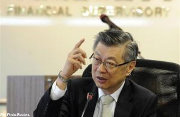 File Photo:Sean Chen File Photo:Sean Chen
|
 Taiwan labour minister's resignation approved, deputy to be successor Taiwan labour minister's resignation approved, deputy to be successor
Premier Sean Chen yesterday approved Labor Minister Wang Ju-hsuan's resignation, and named her deputy as the successor.
Chen told the press following a question-and-answer session at the Legislature that he had approved the resignation at noon, and had reported the situation to President Ma Ying-jeou.
He praised Wang for her devoted service and achievements during her four-plus years of leadership at the Council of Labor Affairs (CLA).
Chen described Deputy Labor Minister Pan Shih-wei as a suitable candidate to succeed Wang under such circumstances.
Cabinet spokesman Hu Yu-wei later disclosed that Pan has been named labour minister and the premier will ask President Ma to finalize the appointment.
Pan, who holds a Ph.D. in industrial and labour relations from Cornell University, has been vice president of the International Confederation of Free Trade Unions' Asia Pacific Regional Organisation and is an assistant professor of labour studies at Chinese Culture University.
Wang on Wednesday tendered her resignation after the Cabinet blocked her proposal for an increase in the minimum monthly wage.
Ma and Chen had tried to keep her in office, but she had been determined to leave.
As the Cabinet has decided to freeze the monthly minimum wage until the economy improves, it remains to be seen whether the incoming minister will be as determined as Wang to continue putting foreign labour under minimum wage protection.
Earlier, Pan declined to comment on speculation over the possibility of him succeeding Wang, but urged related government bodies to jointly work out an acceptable solution to the wage issue concerning foreign labour.
He noted that wage row should be looked at from two different angles: the economic and trade perspective of the issue and the human rights side.
The economics and trade authorities should study whether denying foreign labour minimum wage protection will undermine Taiwan's bid to sign free trade agreements (FTAs) with other countries, and the Ministry of Justice (MOJ) should determine whether such a move is a violation of human rights, Pan said.
Pan stressed that the CLA's position has remained the same.
Wang has stressed that separating foreign workers' wage level from that of locals will undermine Taiwan's chance of signing FTAs with countries that are against labour exploitation.
But an investment official from the Ministry of Economic Affairs (MOEA) cited the case of Singapore as an example when dismissing Wang's concerns, according to the Central News Agency.
The official said foreign laborers working in Singapore do not enjoy the same wages as their local counterparts, but the city-state has had no problem signing FTAs with others.
Premier Chen said the CLA, MOEA and MOJ may work together to find a solution.
Chen said giving foreign laborers the minimum wage protection may deter investors from running production in Taiwan and subsequently reduce job openings.
Meanwhile, labour groups lauded Wang for working for the benefits of workers, but lamented her departure as marking a major step backwards in terms of social justice.
They also said her resignation was a heavy blow to the CLA's morale.
(2012-09-29/asiaone)
|





 File Photo:Sean Chen
File Photo:Sean Chen